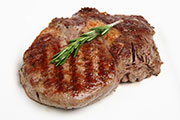- The Best Time of Day to Drink Bone Broth to Maximize Health Benefits
- 8 Ways to Increase Dopamine Naturally
- 7 Best Breads for Maintaining Stable Blood Sugar
- Gelatin vs. Collagen: Which is Best for Skin, Nails, and Joints?
- The Long-Term Effects of Daily Turmeric Supplements on Liver Health
- Could Your Grocery Store Meat Be Causing Recurring UTIs?
- Are You Making This Expensive Thermostat Error This Winter?
- Recognizing the Signs of Hypothyroidism
- 10 Strategies to Overcome Insomnia
- Could Artificial Sweeteners Be Aging the Brain Faster?
High-Protein Diets in Middle Age Might Shorten Life Span


Millions of middle-aged Americans chow down each day on steaks, cheeseburgers and other protein-rich fare.
Now two studies find that diets high in meat and cheese, when eaten in middle age, might shorten people’s life spans.
However, in a surprise twist, the same research team found that eating lots of animal-based protein in old age might actually do the opposite.
“The research shows that a low-protein diet in middle age is useful for preventing cancer and overall mortality [death],” study co-author Eileen Crimmins, the AARP Chair in Gerontology at the University of Southern California, said in a university news release. “However, we also propose that at older ages, it may be important to avoid a low-protein diet to allow the maintenance of healthy weight and protection from frailty.”
The findings were published March 4 in the journal Cell Metabolism
In the study, the researchers looked at data on more than 6,800 middle-aged and older adults in the United States. They found that 50-year-olds who got more than 20 percent of their calories from animal protein — mainly meat or dairy products — had a fourfold increased risk of death from cancer or diabetes. And they had a nearly twofold increased risk of death from any cause over the next 18 years, compared to people on more low-protein regimens.
Even middle-aged people who consumed only “moderate” levels of animal protein had a threefold increased risk of death from cancer, the researchers reported.
This increased risk of death was much lower or non-existent in 50-year-olds who ate a diet high in protein sourced mainly from plants, the researchers added.
However, the study also found that people older than 65 who consumed high amounts of animal protein had a 60 percent lower risk of dying from cancer and a 28 percent lower risk of death from any cause, compared to people who shied away from meat and dairy at this age. Similar benefits were seen in seniors who had moderate levels of protein intake.
“The majority of Americans are eating about twice as much protein as they should, and it seems that the best change would be to lower the daily intake of all proteins but especially animal-derived proteins,” at least in middle age, study senior author Dr. Valter Longo, of the University of Southern California, said in the university news release. “But don’t get extreme in cutting out protein; you can go from protected to malnourished very quickly.”
A second study, this time conducted in mice, found that a high-protein, low-carbohydrate diet shortened the rodents’ lifespan.
Overall, the findings provide “convincing evidence that a high-protein diet — particularly if the proteins are derived from animals — is nearly as bad as smoking for your health,” Longo said in a journal news release. He was the senior author of the study conducted in humans.
The effects of protein consumption on a person’s risk of an early death may be partly due to the activation of natural growth hormone and a cellular growth factor called IGF-1, the researchers explained.
“Notably, the activity of these factors, but also body weight, declines naturally with aging, which may explain why older people not only did not benefit but appeared to do worse if they ate a low-protein diet,” Longo said.
The researchers believe the studies will boost understanding about links between diet and health.
“We have shown explicitly why it is that calories aren’t all the same — we need to look at where the calories come from and how they interact,” Steve Simpson, senior author of the mouse study, said in the journal news release.
“This research has enormous implications for how much food we eat, our body fat, our heart and metabolic health, and ultimately the duration of our lives,” said Simpson, a researcher at the University of Sydney in Australia.
More information
The U.S. National Library of Medicine has more about dietary proteins.
Source: HealthDay
Copyright © 2026 HealthDay. All rights reserved.










